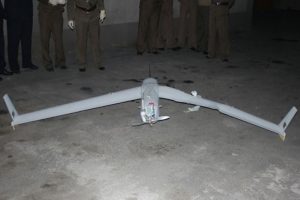Tensions are once again high on the Korean Peninsula.
In a statement on October 11, North Korea’s Ministry of Foreign Affairs accused South Korea of sending unmanned drones over Pyongyang on three separate occasions earlier this month. The drones allegedly carried and dispersed a large number of propaganda leaflets over the capital.
South Korea’s Joint Chiefs of Staff denied these allegations but have refused to provide specific details, including whether the North might have staged the incident. In response, Pyongyang has ordered military units to reinforce anti-air observation posts and warned of an “immediate retaliatory attack” should another violation occur.
Further complicating the matter, South Korea’s spy agency recently learned that North Korea has dispatched 1,500 troops to support Russia’s war efforts in Ukraine. The final tally is expected to be as high as 12,000. If Seoul decides to send lethal weapons to Ukraine in response, it could potentially open the door to a wider conflict in both regions of the world.
In an interview with The Diplomat, Dr. Cho Han-bum, a senior research fellow at the state-run Korea Institute for National Unification, shared his insights on these developments. (This interview was conducted on October 21, and there have been new developments since.)
What are your thoughts on Pyongyang’s allegations over unmanned drones?
It is hard to attribute the recent drone incident to either a staged action by North Korea or an operation by the South Korean military. If this were a self-fabricated scenario by North Korea, it would be puzzling as to why they would concoct a narrative suggesting that their air defenses were breached and that the headquarters of the Central Committee of Workers’ Party were exposed.
On the other hand, the drones North Korea claims resemble South Korean military drones lack the capacity for extended flight and leaflet deployment. If South Korean military drones had been used, traces would likely be left behind, making such an operation too risky.
Therefore, the most plausible explanation is that a civilian organization in South Korea operated the drone, as similar incidents have occurred previously.
How do North Korea’s trash-filled balloons differ from an unmanned drone?
Airspace violations by drones pose significant concerns under international law. Drones equipped with engines qualitatively differ from balloons, as the latter rely on air currents for movement. Drones are particularly sensitive from a military perspective because they can be weaponized. However, on this occasion, North Korea’s position was weakened by its launching of trash-filled balloons directed at the South.
North Korea’s behavior since the drone incident is echoing a wartime situation. What are the Kim regime’s intentions?
The airspace over the Workers’ Party headquarters, home to Kim Jong Un’s office, was breached, resulting in a state of emergency in North Korea. The Kim regime’s decision to disclose this information to the public likely stems from the fact that many residents of Pyongyang may have already seen the [anti-regime] flyers. Faced with this challenging situation, the Kim regime is seeking to leverage the incident to incite hostility toward the South, aiming to reinforce Kim Jong Un’s two-state theory.
Is there a possibility of further escalation?
North Korea has vowed to shoot down any additional unmanned aerial vehicles, while the South Korean military is expected to respond should any shells enter South Korean territory. This could potentially escalate tensions. But if the drone infiltration ceases, it seems North Korea intends to manage the situation.
Pyongyang and Moscow are becoming increasingly close. What are the security implications for East Asia, and how should South Korea respond?
North Korea’s military ties with Russia have reached a concerning level, with rumors suggesting that North Korean troops may be sent to Russia. If true, it could increase the likelihood of South Korea exporting lethal weapons to Ukraine, further fueling tensions on the Korean Peninsula. At this point, the deployment of North Korean fighters to Russia is still speculative. Seoul, therefore, should leverage the prospect of “arms support for Ukraine” to deter Moscow from crossing the line.
(Editor’s note: Since this interview was conducted, the reports of North Korean troops in Russia have been confirmed by the governments of Ukraine and the United States.)
The reports of North Korean troops being sent to Russia can be interpreted as evidence of Russia’s desperation. For Moscow, it would be difficult to abandon its relationship with Seoul, as it needs to rebuild its economy once the war settles in Ukraine. Managing the current situation will require strategic communication between South Korea and Russia.
Do Kim Jong Un’s provocations and closer relationship with Putin indicate instability within North Korea?
North Korea is grappling with significant issues, including ideological confusion stemming from Kim’s declaration of a two-state theory and the abandonment of [the pursuit of] a reunified Korea. The country is also experiencing a severe economic crisis and inflicting self-harm by policy missteps such as the likely military deployment to Russia and the looming prospect of mass casualties in a warzone.
Kim’s ability to manage these crises is under scrutiny, which places the regime in a very precarious state. Nonetheless, while sporadic riots or uprisings may be possible, organized resistance in North Korea is unlikely to emerge at this point.

































